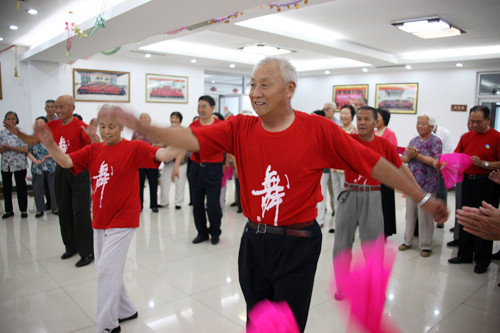|
 |
|
AGE-DEFYING MOVES: Residents of a nursing home in Zouping, eastern Shandong Province, learn to dance in July 2011 (ZHANG YANHUI) |
Zhang Yinsheng used to believe that aging was about feeling the staircases in his building growing longer as he climbed them. Having lived in an apartment next to Beijing's Third Ring Road with his wife for decades, he didn't realize the urgency of moving to a nursing home until a kitchen fire broke out two years ago. After cooking lunch for his wife and himself, Zhang forgot to turn off the gas, which resulted in a small fire that burned the vent hood and scared the neighbors.
"Seeing the flames, I was really terrified. It suddenly dawned on me that leading an independent, peaceful retired life with my wife was no longer within my capacity," Zhang, 90, who now lives in a nursing home in Beijing's suburbs, told newspaper The Beijing News.
Shortly after the kitchen fire, Zhang's wife, two years his junior, was injured when she was hit by a car during a morning stroll. Two of Zhang's four children who live in Beijing had to increase the frequency of their visits from weekly to daily to take care of their mother for half a year. "They are both senior citizens themselves with silver hair and wrinkled faces," said Zhang. "It pained me to see them climbing the stairs with difficulty."
Then Zhang started to looking for a nursing home, which turned out to be a difficult and lengthy process.
According to government statistics, by the end of 2011 Beijing had 401 nursing homes for the elderly, of which 215 were public and 186 were private, providing a total of 69,000 beds.
Zhang's children preferred public nursing homes not only because they are more affordable but also because they are generally located close to the city center making visits more convenient.
However, all the public care providers Zhang called told him that they had no spare beds and that he had to register on a waiting list. The waiting list for one nursing home was a staggering 7,000 people, which the institution could only process in 10 years.
After losing hope of being admitted to a government-subsidized institution, Zhang had to go down the private route. There are two kinds of private senior homes in Beijing, expensive urban ones with the facilities of star-rated hotels and suburban ones with modest facilities, and sometimes without their own clinics or doctors.
After finding that the urban senior homes cost between 5,000 yuan ($794) and 30,000 yuan ($4,762) per month, Zhang and his wife, with monthly pensions totaling less than 7,000 yuan ($1,111), eventually moved into a room of less than 20 square meters in a suburban facility. They pay monthly fees of 2,300 yuan ($365) per person.
Just as the old couple was getting used to being disturbed at night by the cries of a man with dementia living in the opposite room, they heard a piece of unsettling news: the facility was going to be moved.
The land rented by the nursing home owner had been purchased by a commercial real estate developer, which plans to build a residential apartment on the site.
A number of nursing homes in Beijing have been forced to move or even close following the expiration of their land lease contracts.
"We weren't even able to find peace, even in the suburbs. We are too old to move again," Zhang said.
As the most populous country in the world, China is also the only country with a senior population of more than 100 million. At a national conference on caring for the elderly on March 1, the Ministry of Civil Affairs announced that by the end of 2011 China had 185 million people 60 years of age or older, constituting 13.7 percent of its total population. The ministry also estimated that in four years the population of the elderly will grow by more than 43 million to 221 million, including 24 million 80-year-old or older.
For hundreds of years, the ideal family model in China was four generations under one roof. In these close-knit large families, the responsibility of caring for the elderly fell on the shoulders of younger family members. However, with an increase of nuclear families, and following the implementation of the family planning policy, this structure of caring is no longer viable in many cases.
| 